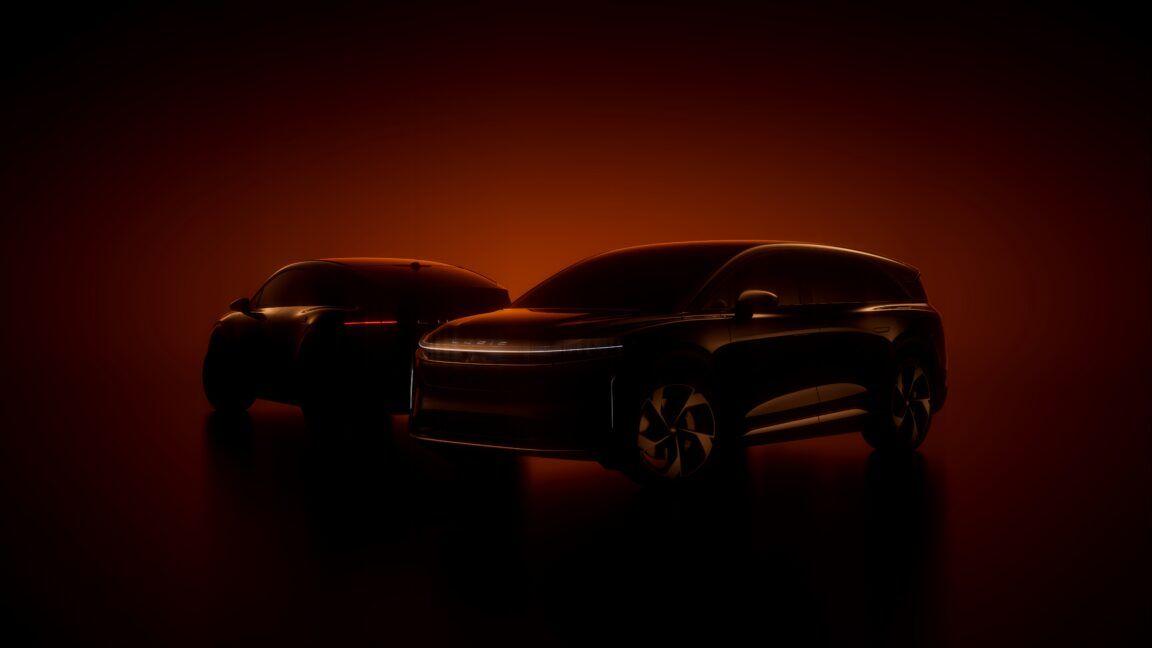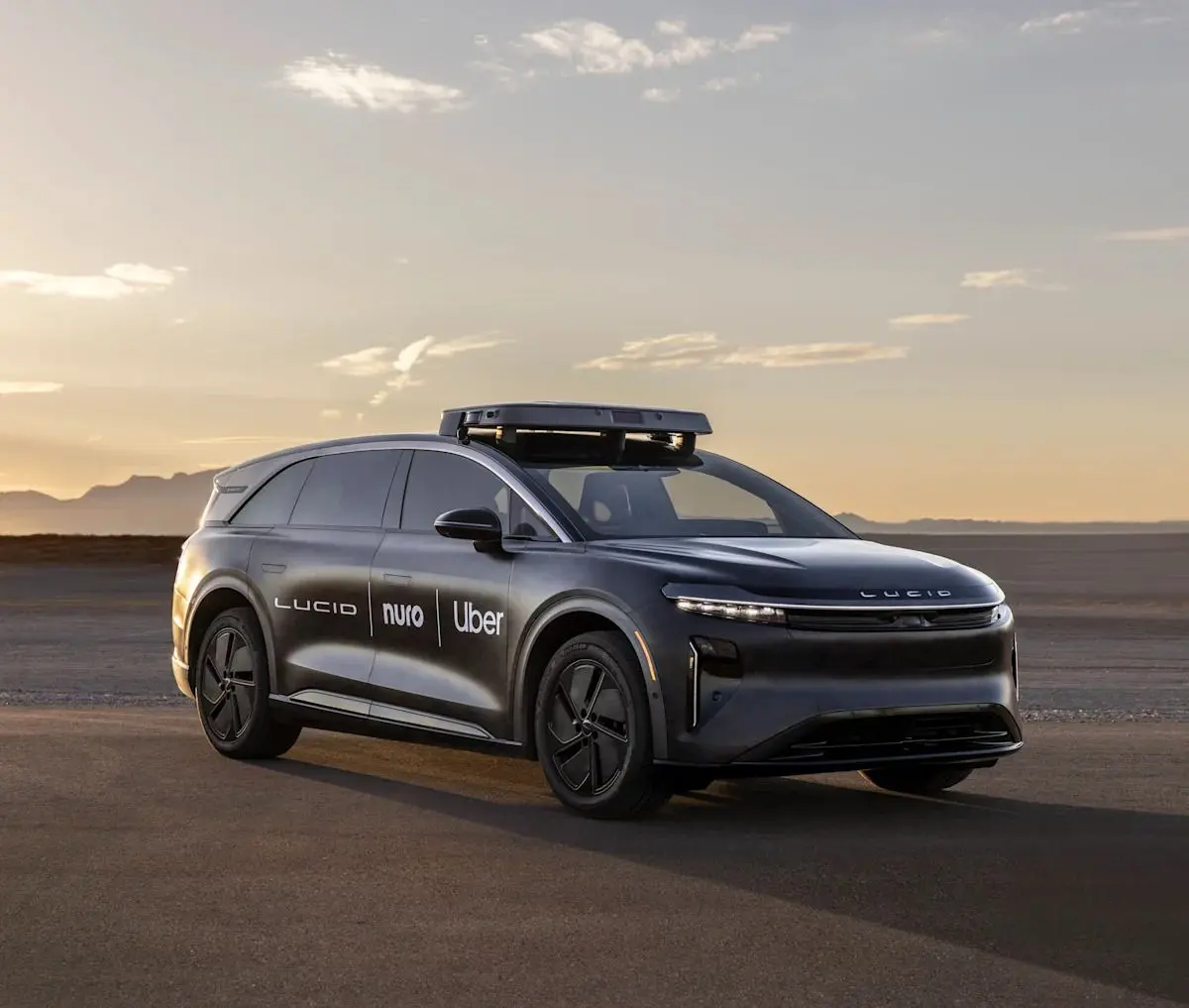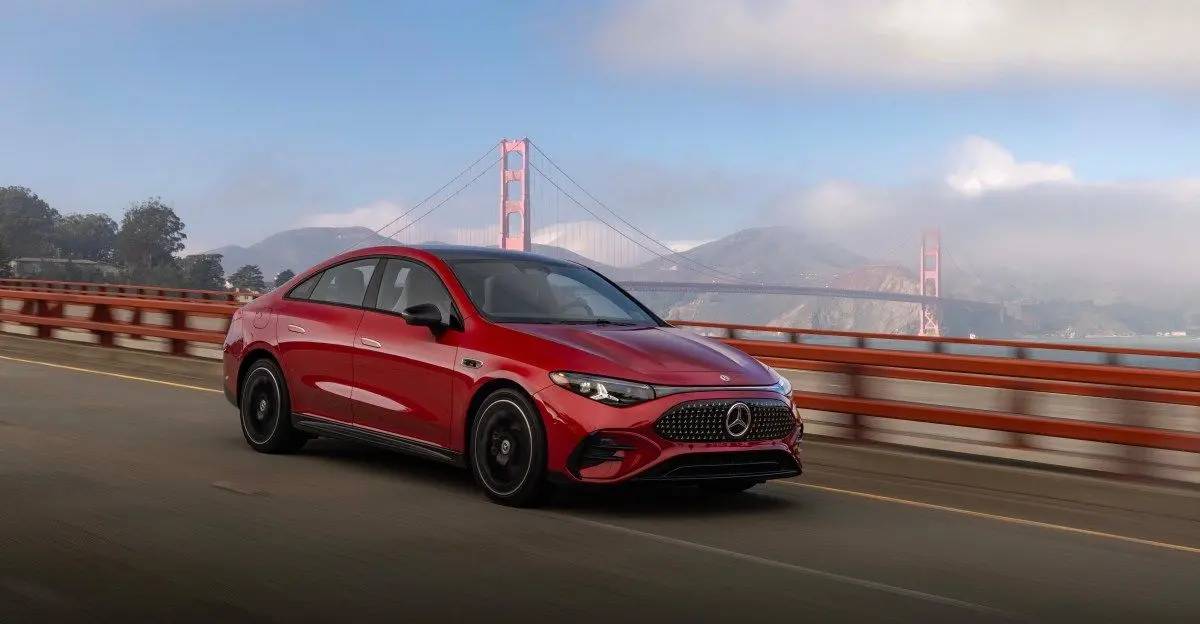Lucid Motors Partners with Nvidia to Develop Consumer-Owned Level 4 Autonomous Vehicles
4 Sources
4 Sources
[1]
An autonomous car for consumers? Lucid says it's happening.
Is it possible to be a CEO in 2025 and not catch a case of AI fever? The latest company to catch this particular cold is Lucid, the Saudi-backed electric vehicle startup. Today, it announced a new collaboration with Nvidia to use the latter's hardware and software, with the aim of creating an autonomous vehicle for consumers. Oh, and the AI will apparently design Lucid's production lines. Formed by refugees from Tesla who saw a chance to improve on their past work, Lucid has already built the most efficient EV on sale in North America. But until recently, it also just had variants of the same Air sedan to offer consumers, before the Gravity SUV joined the range this year. The company will need to start selling tens of thousands of EVs a year before too long, especially if it's ever to become profitable. And that will involve some smaller, cheaper models, starting with a midsize crossover sometime in 2027. A major goal for the first of those EVs is a starting price of less than $50,000, so I hope they're getting a good deal on the Nvidia GPUs that Lucid now says will enable a "true eyes-off, hands-off, and mind-off" autonomous driving system for consumer-owned vehicles. "We've already set the benchmark in core EV attributes with proprietary technology that results in unmatched range, efficiency, space, performance, and handling," said interim CEO Marc Winterhoff. "Now, we're taking the next step by combining cutting-edge AI with Lucid's engineering excellence to deliver the smartest and safest autonomous vehicles on the road. Partnering with Nvidia, we're proud to continue powering American innovation leadership in the global quest for autonomous mobility," Winterhoff said. Good news if you sell GPUs First, Lucid will roll out a more advanced version of its partially automated driving assist for the Gravity SUV, which it says has been "turbocharged by Nvidia Drive AV." But after that, the plan is for a so-called "level 4" autonomous system, capable of driving itself from point to point without human intervention, at least within a geofence or other limited operational design domain. In scope, this is more limited and more achievable than the "level 5," go-anywhere dream of Tesla's FSD system. It is similar to the level 4 autonomous vehicles being developed by companies like Waymo and Zoox, but those are also designed to be operated by fleets with regular maintenance. Lucid will use Nvidia's platform to reach level 4, building a pair of Drive AGX Thor computers into the new midsize EV platform. And leaning on Nvidia's software means Lucid doesn't have the hard ongoing job of keeping everything up to date. "As vehicles evolve into software-defined supercomputers on wheels, a new opportunity emerges -- to reimagine mobility with intelligence at every turn. Together with Lucid, we're accelerating the future of autonomous, AI-powered transportation, built on [the] Nvidia full-stack automotive platform," said Jensen Huang, founder and CEO of Nvidia. Car buyers are starting to cotton on to driver assists like General Motors' Super Cruise, which about 40 percent of customers choose to pay for after the three-year free trial ends, and Lucid must be hoping that offering a far more advanced system, which won't require the human to pay any attention while it is engaged, will help it earn plenty of money. The other part of the Lucid/Nvidia announcement may have the potential for even more impact on the profit and loss statements. Nvidia's industrial platform will let Lucid create its production lines digitally first before committing them to actual hardware. "By modeling autonomous systems, Lucid can optimize robot path planning, improve safety, and shorten commissioning time," Lucid said.
[2]
Lucid jumps on the 'privately owned' autonomous vehicle bandwagon
Lucid says it will eventually sell "privately owned" autonomous vehicles with the help of Nvidia's artificial intelligence technology. The company is the latest to declare its intention to sell Level 4 autonomous vehicles to its customers, despite a range of theoretical and logistical challenges standing in the way. Lucid's autonomous vehicles -- which do not exist at the moment -- will be powered by Nvidia's Drive AV platform, which the chipmaker has described as a "modular, flexible approach" that "empowers" automakers to take as much as they need. Nvidia's system collects and consolidates data from multiple sensors, and improves continuously through over-the-air software updates. Lucid is taking a page from Tesla in positioning its current driver assist system, DreamDrive Pro, as a gateway to Level 4 autonomous driving. The automaker currently makes two models, the Air sedan and the Gravity SUV, with a third, midsized SUV is coming in 2026. The unnamed midsized EV will come with a range of sensors, including cameras, lidar, and radar, that will power a "the first true eyes-off, hands-off, and mind-off (L4) consumer owned autonomous vehicle." The brain of the vehicle will be comprised of two Nvidia Drive AGX Thor computers, running on the chipmaker's DriveOS software. Personally owned autonomous vehicles are increasingly a captivating challenge for many companies. Early on, many experts dismissed the idea, arguing that the technology to power fully autonomous driving was too expensive for private sales. Instead, fleet-owned robotaxis were the safer bet, helping amortize the costs of all the sensors and high-powered computing power needed to enable self-driving cars. But now the costs for many of that equipment, including lidar, is coming down, resurfacing the idea that autonomous vehicles can be cheap enough to sell to regular people. Whether it actually works out that way remains to be seen. Waymo, the clear leader in the robotaxi space, only operates in a handful of markets and is expected to be unprofitable for quite a while. Personally owned autonomous vehicles could become a reality, but perhaps at a huge loss to the company selling them. The announcement is the latest attempt by an automaker to re-position its product lineup in the aftermath of the expiration of the $7,500 EV tax credit. Without the tax credit, EV sales are expected to drop dramatically. And automakers are trying to convince investors that they are diversified enough to withstand the slowdown. General Motors rolled out a raft of announcements last week around partially autonomous vehicles and home energy. And now Lucid, which makes luxury and performance EVs, is doing the same. Lucid is also planning on selling thousands of its vehicles to Uber to retrofit into robotaxis, with the first service expected to launch in 2026.
[3]
Lucid Wants To Sell The First 'Mind-Off' Autonomous Car With Nvidia's Help
Lucid Motors wants to be the first automaker to sell you a Waymo-grade self-driving car, it said on Tuesday. But it's not going it alone, and that audacious bet rests on a wide-ranging partnership to use self-driving hardware and software from Nvidia. The electric vehicle startup announced that it will incorporate the chipmaker's Drive AGX Thor computers, DriveOS operating system and Drive AV autonomous software in its upcoming lineup of midsize EVs, which start launching in late 2026. Lucid says that Nvidia technology should deliver Level 4 autonomous driving to personal vehicles, a holy grail that car companies have dreamed about for decades but haven't made a reality. "Together with Lucid, we're accelerating the future of autonomous, AI-powered transportation, built on Nvidia's full-stack automotive platform," Nvidia founder and CEO Jensen Huang said in a statement. The Nvidia-powered overhaul of Lucid's driver-assistance tech will start with Level 2 eyes-on, point-to-point driving features, much like what Tesla offers today through its Full Self-Driving (Supervised) suite. The system should allow drivers to put in a destination and have the car navigate itself there, under full supervision. That will be available in the midsize model at launch and should hit the new Gravity SUV around the end of 2026, a Lucid spokesperson said. The Gravity's hardware will remain as is. It's just getting new Nvidia software. The midsize lineup, however, will benefit from two Drive AGX Thor computers and Nvidia's "multi-sensor suite architecture," which includes lidar, radar and cameras. Lucid plans to upgrade the midsize model's capability to Level 4 over "a couple of years" after launch, spokesperson Justin Berkowitz said. Level 4 technology, as defined by SAE, refers to a car that can drive itself without human supervision under specific conditions. Waymo's taxis, for example, are Level 4 because they only work in specific places. A theoretical Level 5 car would be able to drive anywhere, anytime, rain or shine. Lucid's lower-cost midsize vehicles were already critical to the company's growth and survival -- the Tesla Model Y moment Lucid needs after launching the dazzling but expensive and low-volume Air and Gravity. Now Lucid's lofty ambitions around self-driving hinge on the next-generation models too. The Nvidia partnership can be seen as a strategic shift. Lucid's advanced driver-assistance system, DreamDrive, has always been a home-brewed affair. And it even recently upgraded that this summer to offer hands-free highway driving. Now the company is leaning on outside hardware and software to take its driver-assistance features to the next level. The decision had to do with quickly getting to higher levels of autonomy, Berkowitz said. Many carmakers are working toward the tantalizing goal of a personally owned car that can drive you from your garage to work as you catch up on emails or take a nap. Approaches vary across the industry, but none have fully cracked the code. Mercedes-Benz offers the closest thing to a self-driving car you can buy. Its Level 3 Drive Pilot system can automate highway driving without active driver attention. It just only works at low speeds, in traffic and on certain highways in Nevada and California. Ford has a subsidiary called Latitude AI that is working on eyes-off, hands-off systems to build on its BlueCruise system. General Motors this month said that eyes-off Super Cruise, aided by a new lidar sensor, would hit the Cadillac Escalade in 2028, before expanding to off-highway roads. Last year, it announced it would use Nvidia chips for personal autonomous vehicles, but stopped short of saying it would use Nvidia's full-stack solution like Lucid plans to. Toyota and Waymo announced a potential partnership this year to develop "a new autonomous vehicle platform," but we don't know what exactly that will yield, if anything. Rivian has made in-house autonomous driving development increasingly central to its mission. It now aims to launch eyes-off driving in 2026, eventually taking that to more and more environments. A new car startup called Tensor came out of basically nowhere in August, claiming to be the first company that will sell you a "robocar." Of course, Tesla has promised that its $8,000 Full Self-Driving system would live up to its name for years. It began offering driverless rides through a robotaxi service in Austin in June, a big step forward. It's not yet clear which company will be first here. But the reward for the winner -- the company that can navigate the technological, regulatory and legal hurdles and deliver a self-driving car to your driveway -- will be huge.
[4]
Lucid and NVIDIA partner to deliver Level 4 autonomous vehicles
Image: Supplied Lucid Group, Inc., maker of the world's most advanced electric vehicles, has announced a landmark collaboration with NVIDIA to accelerate its journey toward full vehicle autonomy and intelligent manufacturing. The partnership will see Lucid deploy NVIDIA DRIVE AV to power one of the world's first privately owned passenger vehicles with Level 4 autonomous driving capabilities, while also leveraging NVIDIA's Industrial AI platform to transform its production ecosystem. In addition, Lucid plans to implement a unified AI factory powered by NVIDIA Omniverse and NVIDIA AI Enterprise, enabling smart manufacturing, process optimisation, and enhanced operational agility. "Our vision is clear: to build the best vehicles on the market," said Marc Winterhoff, interim CEO of Lucid. "We've already set the benchmark in core EV attributes with proprietary technology that results in unmatched range, efficiency, space, performance, and handling. Now, we're taking the next step by combining cutting-edge AI with Lucid's engineering excellence to deliver the smartest and safest autonomous vehicles on the road. Partnering with NVIDIA, we're proud to continue powering American innovation leadership in the global quest for autonomous mobility." "As vehicles evolve into software-defined supercomputers on wheels, a new opportunity emerges -- to reimagine mobility with intelligence at every turn," said Jensen Huang, founder and CEO of NVIDIA. "Together with Lucid, we're accelerating the future of autonomous, AI-powered transportation, built on NVIDIA's full-stack automotive platform." Lucid's push toward autonomy began with DreamDrive Pro, its in-house advanced driver assistance system launched on the Lucid Air in 2021. Recent updates have introduced hands-free driving and automated lane-change features via over-the-air software enhancements. The company's next phase, powered by NVIDIA DRIVE AV, will enable L2++ (eyes-on) autonomy in the upcoming Lucid Gravity and midsize models, progressing toward full L4 (eyes-off) self-driving capabilities. To achieve this, Lucid will integrate NVIDIA's multi-sensor suite architecture -- comprising cameras, radar, and lidar -- along with dual NVIDIA DRIVE AGX Thor computers running the safety-certified NVIDIA DriveOS. This centralised AI computing architecture is designed to unify all automated driving functions and support seamless scalability as autonomy advances. The collaboration will also introduce new autonomous features in Lucid Gravity, reinforcing its global position in next-generation mobility following its European debut. Through NVIDIA's scalable software-defined platform, Lucid vehicles will continuously evolve via over-the-air updates, ensuring long-term innovation and relevance. Beyond autonomy, Lucid is embracing a Software-Driven Manufacturing approach using NVIDIA's Industrial AI tools to enhance factory intelligence. The company is deploying predictive analytics, robotics, and digital twins to optimise workflows, improve quality, and enable reconfigurable production lines. This strategy will help reduce costs, accelerate delivery timelines, and enhance operational resilience. Lucid's partnership with NVIDIA marks a defining moment for the EV industry -- one that fuses luxury, performance, and autonomy with AI-driven manufacturing excellence, reshaping the future of mobility from the road to the production line.
Share
Share
Copy Link
Lucid Motors announces a major partnership with Nvidia to create one of the world's first privately owned Level 4 autonomous vehicles, targeting launch with their upcoming midsize EV platform in 2026-2027.
Partnership Overview
Lucid Motors, the Saudi-backed electric vehicle startup, has announced a comprehensive partnership with Nvidia to develop what it claims will be one of the world's first privately owned Level 4 autonomous vehicles
1
. The collaboration represents a significant strategic shift for Lucid, which has previously relied on in-house development for its DreamDrive Pro advanced driver assistance system3
."We've already set the benchmark in core EV attributes with proprietary technology that results in unmatched range, efficiency, space, performance, and handling," said interim CEO Marc Winterhoff. "Now, we're taking the next step by combining cutting-edge AI with Lucid's engineering excellence to deliver the smartest and safest autonomous vehicles on the road"
4
.Technical Implementation
The autonomous driving system will be built around Nvidia's Drive AV platform, featuring dual Drive AGX Thor computers running the safety-certified DriveOS operating system
3
. The hardware package includes a comprehensive multi-sensor suite architecture comprising cameras, radar, and lidar sensors, designed to enable what Lucid describes as "true eyes-off, hands-off, and mind-off" autonomous driving1
.The rollout will be phased, beginning with enhanced Level 2 driver assistance features for the Gravity SUV by the end of 2026, followed by the full Level 4 capability in the upcoming midsize EV platform launching in late 2026
3
. Level 4 autonomy represents a significant leap from current systems, allowing vehicles to drive themselves without human intervention within specific operational design domains, similar to Waymo's robotaxi service but for privately owned vehicles2
.
Source: Ars Technica
Market Context and Competition
Lucid's announcement comes amid a broader industry push toward privately owned autonomous vehicles, a concept that was previously dismissed as too expensive for consumer markets
2
. The company joins a growing list of automakers pursuing similar goals, including General Motors, which announced plans for eyes-off Super Cruise with lidar sensors for the Cadillac Escalade in 2028, and Ford's Latitude AI subsidiary working on advanced autonomous systems3
.The timing is particularly strategic as the automotive industry faces challenges from the expiration of the $7,500 EV tax credit, which is expected to significantly impact EV sales
2
. Automakers are seeking to differentiate their offerings and convince investors of their technological capabilities beyond traditional vehicle manufacturing.Related Stories
Manufacturing Innovation
Beyond autonomous driving, the partnership extends to Lucid's manufacturing operations through Nvidia's Industrial AI platform. The company plans to implement digital twins of its production lines, allowing for virtual optimization before committing to physical hardware
1
. This approach, powered by Nvidia Omniverse and AI Enterprise platforms, aims to improve robot path planning, enhance safety protocols, and reduce commissioning time4
.The manufacturing component could prove equally important for Lucid's bottom line, as the company needs to scale production significantly to achieve profitability. The startup currently produces only variants of its Air sedan and the recently launched Gravity SUV, but plans to introduce more affordable models starting with a midsize crossover priced under $50,000 in 2027
1
.References
Summarized by
Navi
[1]
[4]
Related Stories
Nvidia Expands AI Partnerships for Next-Generation Autonomous Vehicles
07 Jan 2025•Technology

Uber's Ambitious Robotaxi Plan: 20,000 Lucid EVs with Nuro's AI Technology
18 Jul 2025•Technology

Nvidia launches Alpamayo open AI models to bring human-like reasoning to autonomous vehicles
06 Jan 2026•Technology

Recent Highlights
1
ByteDance's Seedance 2.0 AI video generator triggers copyright infringement battle with Hollywood
Policy and Regulation

2
Demis Hassabis predicts AGI in 5-8 years, sees new golden era transforming medicine and science
Technology

3
Nvidia and Meta forge massive chip deal as computing power demands reshape AI infrastructure
Technology





